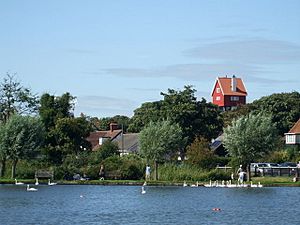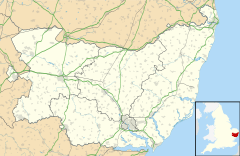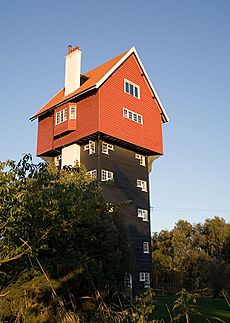Thorpeness facts for kids
Quick facts for kids Thorpeness |
|
|---|---|
 Thorpeness Meare |
|
| Shire county | |
| Region | |
| Country | England |
| Sovereign state | United Kingdom |
| Post town | Leiston |
| Postcode district | IP16 |
| Dialling code | 01728 |
| EU Parliament | East of England |
Thorpeness is a special seaside village in Suffolk, England. It became a popular holiday spot in the early 1900s. This village is part of the Aldringham cum Thorpe area. It is also located within the beautiful Suffolk Coast and Heaths area, which is a protected natural space.
Contents
How Thorpeness Grew
Thorpeness started as a small fishing village in the late 1800s. People even told stories about smugglers using it as a secret route.
A rich family named Ogilvie started buying land here in 1859. In 1910, Glencairn Stuart Ogilvie, a Scottish lawyer, bought even more land. His family had made a lot of money building railways around the world.
Ogilvie wanted to turn Thorpeness into a special holiday village. He invited his friends and their families to stay there in the summer. They built a fancy country club with tennis courts and a swimming pool. There was also a golf course designed by a famous golfer named James Braid. Many holiday homes were built in old English styles, like Jacobean and Tudor Revival.
A train station was even built for Thorpeness in 1914. However, not many people used it, except for golfers. It closed down in 1966.
The House in the Clouds
One very famous building in Thorpeness is the "House in the Clouds". It was built in 1923. It used to be a water tower, which is usually not very pretty. So, they covered the water tank with wood to make it look like a small house on top of a tall tower. There was also a mill next to it that pumped water up.
Later, when the village got regular water pipes, the old water tank was turned into a huge games room. From up high, you can see amazing views of the coast.
For a long time, the Ogilvie family owned most of Thorpeness. They only sold houses to friends as holiday homes. But in 1972, a family member passed away. To pay taxes, many of the houses, the golf course, and the country club had to be sold.
The Meare: A Peter Pan Lake
Thorpeness has a special man-made lake called the Meare. Long ago, this area was a small harbor that filled up with mud.
The idea for the Meare came from J. M. Barrie, who wrote Peter Pan. He was a friend of the Ogilvie family. The lake has many small channels and islands. These islands are named after places from the Peter Pan stories. You can find places like the pirates' lair and Wendy's house. Children are encouraged to play and explore these islands. The lake is also very shallow, which makes it safe for kids.
You can rent different kinds of boats to enjoy the water. Many of these boats are very old, from when the Meare was first made. Local workers who dug the lake gave them their names. Every August, the Thorpeness Regatta is held on the Meare. This boat race has been happening since 1913.
Thorpeness Today
South of the village is the North Warren RSPB reserve. This is a special place for wildlife and nature. It is managed by the Royal Society for the Protection of Birds. It's a protected area for plants and animals.
Like many places on Britain's east coast, Thorpeness sometimes has problems with the sea wearing away the land. People are still talking about how to protect the coast more.
Thorpeness During World War II
During World War II, Thorpeness was an important location.
- Radar Station: There was a radar station here, which helped detect enemy planes.
- Coastal Guns: A large gun was placed on the cliffs to defend the coast. It was even given a name, "John."
- Anti-Aircraft Guns: Guns were also set up to shoot down enemy aircraft.
- Ship Sunk: A ship called the SS Magdapur sank close to Thorpeness after hitting a mine. Another British ship named Thorpeness was sunk by a German torpedo off Spain before the war started.
- Anti-Tank Ditch: Soldiers dug a large ditch from Aldringham to the Meare. This was to stop enemy tanks.
- Soldiers Stationed: Many soldiers were stationed in Thorpeness during the war to help protect the area.
 | Lonnie Johnson |
 | Granville Woods |
 | Lewis Howard Latimer |
 | James West |



